Andy Xu
PLaID++: A Preference Aligned Language Model for Targeted Inorganic Materials Design
Sep 08, 2025Abstract:Discovering novel materials is critical for technological advancements such as solar cells, batteries, and carbon capture. However, the development of new materials is constrained by a slow and expensive trial-and-error process. To accelerate this pipeline, we introduce PLaID++, a Large Language Model (LLM) fine-tuned for stable and property-guided crystal generation. We fine-tune Qwen-2.5 7B to generate crystal structures using a novel Wyckoff-based text representation. We show that generation can be effectively guided with a reinforcement learning technique based on Direct Preference Optimization (DPO), with sampled structures categorized by their stability, novelty, and space group. By encoding symmetry constraints directly into text and guiding model outputs towards desirable chemical space, PLaID++ generates structures that are thermodynamically stable, unique, and novel at a $\sim$50\% greater rate than prior methods and conditionally generates structures with desired space group properties. Our experiments highlight the effectiveness of iterative DPO, achieving $\sim$115\% and $\sim$50\% improvements in unconditional and space group conditioned generation, respectively, compared to fine-tuning alone. Our work demonstrates the potential of adapting post-training techniques from natural language processing to materials design, paving the way for targeted and efficient discovery of novel materials.
SmartAvatar: Text- and Image-Guided Human Avatar Generation with VLM AI Agents
Jun 05, 2025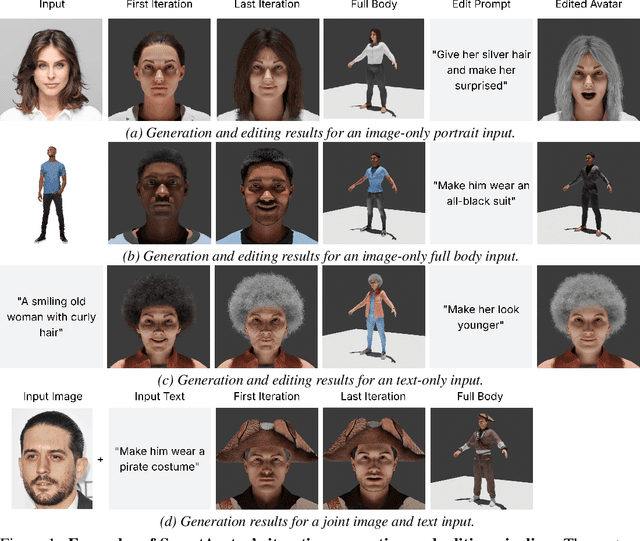



Abstract:SmartAvatar is a vision-language-agent-driven framework for generating fully rigged, animation-ready 3D human avatars from a single photo or textual prompt. While diffusion-based methods have made progress in general 3D object generation, they continue to struggle with precise control over human identity, body shape, and animation readiness. In contrast, SmartAvatar leverages the commonsense reasoning capabilities of large vision-language models (VLMs) in combination with off-the-shelf parametric human generators to deliver high-quality, customizable avatars. A key innovation is an autonomous verification loop, where the agent renders draft avatars, evaluates facial similarity, anatomical plausibility, and prompt alignment, and iteratively adjusts generation parameters for convergence. This interactive, AI-guided refinement process promotes fine-grained control over both facial and body features, enabling users to iteratively refine their avatars via natural-language conversations. Unlike diffusion models that rely on static pre-trained datasets and offer limited flexibility, SmartAvatar brings users into the modeling loop and ensures continuous improvement through an LLM-driven procedural generation and verification system. The generated avatars are fully rigged and support pose manipulation with consistent identity and appearance, making them suitable for downstream animation and interactive applications. Quantitative benchmarks and user studies demonstrate that SmartAvatar outperforms recent text- and image-driven avatar generation systems in terms of reconstructed mesh quality, identity fidelity, attribute accuracy, and animation readiness, making it a versatile tool for realistic, customizable avatar creation on consumer-grade hardware.
ad-trait: A Fast and Flexible Automatic Differentiation Library in Rust
Apr 22, 2025



Abstract:The Rust programming language is an attractive choice for robotics and related fields, offering highly efficient and memory-safe code. However, a key limitation preventing its broader adoption in these domains is the lack of high-quality, well-supported Automatic Differentiation (AD)-a fundamental technique that enables convenient derivative computation by systematically accumulating data during function evaluation. In this work, we introduce ad-trait, a new Rust-based AD library. Our implementation overloads Rust's standard floating-point type with a flexible trait that can efficiently accumulate necessary information for derivative computation. The library supports both forward-mode and reverse-mode automatic differentiation, making it the first operator-overloading AD implementation in Rust to offer both options. Additionally, ad-trait leverages Rust's performance-oriented features, such as Single Instruction, Multiple Data acceleration in forward-mode AD, to enhance efficiency. Through benchmarking experiments, we show that our library is among the fastest AD implementations across several programming languages for computing derivatives. Moreover, it is already integrated into a Rust-based robotics library, where we showcase its ability to facilitate fast optimization procedures. We conclude with a discussion of the limitations and broader implications of our work.
Testing Neural Network Verifiers: A Soundness Benchmark with Hidden Counterexamples
Dec 04, 2024



Abstract:In recent years, many neural network (NN) verifiers have been developed to formally verify certain properties of neural networks such as robustness. Although many benchmarks have been constructed to evaluate the performance of NN verifiers, they typically lack a ground-truth for hard instances where no current verifier can verify and no counterexample can be found, which makes it difficult to check the soundness of a new verifier if it claims to verify hard instances which no other verifier can do. We propose to develop a soundness benchmark for NN verification. Our benchmark contains instances with deliberately inserted counterexamples while we also try to hide the counterexamples from regular adversarial attacks which can be used for finding counterexamples. We design a training method to produce neural networks with such hidden counterexamples. Our benchmark aims to be used for testing the soundness of NN verifiers and identifying falsely claimed verifiability when it is known that hidden counterexamples exist. We systematically construct our benchmark and generate instances across diverse model architectures, activation functions, input sizes, and perturbation radii. We demonstrate that our benchmark successfully identifies bugs in state-of-the-art NN verifiers, as well as synthetic bugs, providing a crucial step toward enhancing the reliability of testing NN verifiers. Our code is available at https://github.com/MVP-Harry/SoundnessBench and our benchmark is available at https://huggingface.co/datasets/SoundnessBench/SoundnessBench.
HELP: Hierarchical Embeddings-based Log Parsing
Aug 15, 2024



Abstract:Logs are a first-hand source of information for software maintenance and failure diagnosis. Log parsing, which converts semi-structured log messages into structured templates, is a prerequisite for automated log analysis tasks such as anomaly detection, troubleshooting, and root cause analysis. However, existing log parsers fail in real-world systems for three main reasons. First, traditional heuristics-based parsers require handcrafted features and domain knowledge, which are difficult to generalize at scale. Second, existing large language model-based parsers rely on periodic offline processing, limiting their effectiveness in real-time use cases. Third, existing online parsing algorithms are susceptible to log drift, where slight log changes create false positives that drown out real anomalies. To address these challenges, we propose HELP, a Hierarchical Embeddings-based Log Parser. HELP is the first online semantic-based parser to leverage LLMs for performant and cost-effective log parsing. We achieve this through a novel hierarchical embeddings module, which fine-tunes a text embedding model to cluster logs before parsing, reducing querying costs by multiple orders of magnitude. To combat log drift, we also develop an iterative rebalancing module, which periodically updates existing log groupings. We evaluate HELP extensively on 14 public large-scale datasets, showing that HELP achieves significantly higher F1-weighted grouping and parsing accuracy than current state-of-the-art online log parsers. We also implement HELP into Iudex's production observability platform, confirming HELP's practicality in a production environment. Our results show that HELP is effective and efficient for high-throughput real-world log parsing.
Optimal and Stable Multi-Layer Object Rearrangement on a Tabletop
Jun 30, 2023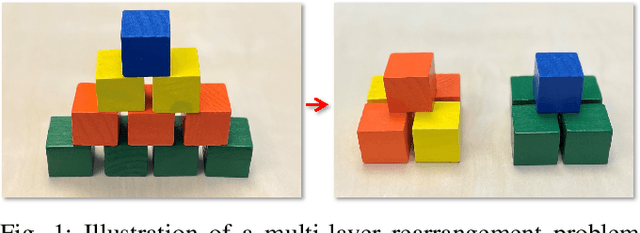
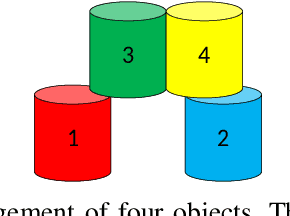
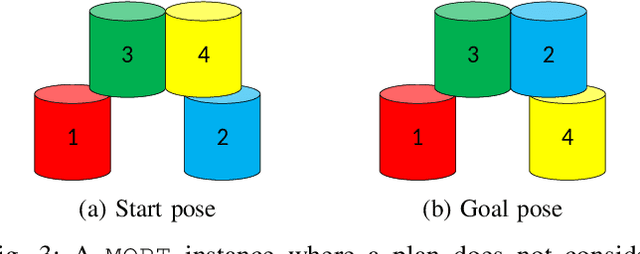
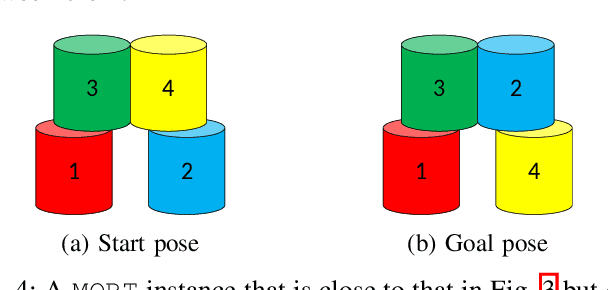
Abstract:Object rearrangement is a fundamental sub-task in accomplishing a great many physical tasks. As such, effectively executing rearrangement is an important skill for intelligent robots to master. In this study, we conduct the first algorithmic study on optimally solving the problem of Multi-layer Object Rearrangement on a Tabletop (MORT), in which one object may be relocated at a time, and an object can only be moved if other objects do not block its top surface. In addition, any intermediate structure during the reconfiguration process must be physically stable, i.e., it should stand without external support. To tackle the dual challenges of untangling the dependencies between objects and ensuring structural stability, we develop an algorithm that interleaves the computation of the optimal rearrangement plan and structural stability checking. Using a carefully constructed integer linear programming (ILP) model, our algorithm, Stability-aware Integer Programming-based Planner (SIPP), readily scales to optimally solve complex rearrangement problems of 3D structures with over 60 building blocks, with solution quality significantly outperforming natural greedy best-first approaches. Upon the publication of the manuscript, source code and data will be available at https://github.com/arc-l/mort/
 Add to Chrome
Add to Chrome Add to Firefox
Add to Firefox Add to Edge
Add to Edge